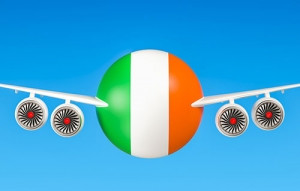Chris Potter
In recent years, Ireland has grown to be the lead aviation hub in Europe. Aircraft leasing is now worth more than €500m to Ireland's economy and supports almost 5,000 jobs.* Major Chinese aircraft lessors, financiers and arrangers have established operations in Ireland and more than 1,100 Chinese-owned aircraft are managed from Dublin, about a quarter of the 4,300-strong global leasing fleet are in Ireland.
Here are the 5 key reasons Ireland is attracting aviation companies and in particular from China:
1. Our taxation regimes: Irelands' taxation regime provides for a stable and competitive headline rate of corporation tax and a tax depreciation write-off period of eight years. There is also an extensive network of double taxation treaties with 74 countries currently in effect.
2. Ireland's low risk profile: Ireland is considered less risky than other countries and is considered by many leading Chinese aviation companies to deliver a more stable return on investment.
3. Legacy experience: Ireland has been involved in the industry for over 40 years since the foundation of Guinness Peat Aviation (GPA) in the 1970's. This has helped cement the country's position as the top global destination for aviation leasing companies.
4. Availability of specialist education programmes in aviation finance: Specialist aviation programmes at UCD's Smurfit Business School and University of Limerick provide a steady flow of talent for firms operating here.
5. Highly skilled workforce: Ireland boasts a deep, multi-disciplinary skills market across technical, legal and financial skill sets.
At GKR we are one of the leading recruiters for the aircraft leasing sector in Ireland. To find out more, speak to a member of our dedicated aircraft leasing team or you can check out our latest vacancies here.
* Source: PwC's Taking Flight 2018 report. https://www.pwc.ie/publications/2018/taking-flight-2018-aviation-leasing-ireland-survey.pdf
Top 10 facts about Ireland’s Aircraft Leasing Sector
Ireland’s Role as a Global Hub for Aircraft Leasing
Over the past several decades, Ireland has established itself as one of the world’s leading hubs for the aircraft leasing industry. Today, the country is widely recognised as a centre of excellence for aircraft leasing, aviation finance, and related professional services, supporting lessors and financiers operating across every major global aviation market.
Below are some of the key factors from the past, present and future that have contributed to Ireland’s success in aircraft leasing and continue to underpin its long-term relevance to the industry.
Fact 1: A long-standing presence in global aircraft leasing
Ireland has over four decades of involvement in aircraft leasing. The country became an early participant in the sector in the 1970s with the establishment of pioneering leasing platforms, helping to lay the foundations for what has since become a globally significant industry cluster. This early mover advantage has played a major role in shaping Ireland’s reputation as a natural home for aircraft leasing businesses.
Fact 2: A global base for leading lessors and financiers
Today, many of the world’s largest aircraft lessors, banks, asset managers and aviation finance platforms operate from Ireland. These organisations use Ireland as a base to finance, manage and lease aircraft to airlines worldwide, making the sector one of Ireland’s most internationally focused industries and a key contributor to the domestic economy.
Fact 3: A strong professional services ecosystem
The scale of aircraft leasing activity managed from Ireland has driven significant growth across professional services. Legal, accounting, tax, technical and advisory firms have developed dedicated aviation teams to support the sector, creating a highly specialised ecosystem that reinforces Ireland’s attractiveness to both established players and new market entrants.
Fact 4: A recognised global meeting point for aviation finance
Ireland regularly hosts major international aviation finance and leasing conferences, attracting thousands of industry professionals from around the world. These events further reinforce Ireland’s position as a focal point for industry dialogue, deal-making and collaboration across the global aviation community.
Fact 5: Significant long-term growth in leasing activity
Over time, the value of aircraft assets managed through Ireland has grown substantially, driven by both organic growth among established lessors and the arrival of new entrants. This expansion reflects the increasing importance of leasing within the global aviation industry and Ireland’s role in supporting that growth.
Fact 6: Strong links to high-growth aviation markets
A large proportion of global aircraft leasing demand is driven by emerging and high-growth regions, particularly in the Asia-Pacific region. Ireland’s leasing platforms are deeply connected to these markets, supporting airlines and operators as they expand fleets to meet rising passenger demand.
Fact 7: A coordinated industry voice
The aircraft leasing sector in Ireland is supported by an established industry body that represents the interests of lessors operating in the jurisdiction. This organisation plays a role in industry engagement, policy dialogue and the promotion of Ireland as a global leasing centre.
Fact 8: An extensive international tax treaty network
Ireland’s broad network of double taxation treaties continues to be an important factor in its attractiveness to aircraft lessors operating on a global basis. Ongoing engagement with international markets helps ensure Ireland remains competitive as leasing activity expands into new regions.
Fact 9: Ireland’s continued appeal amid global regulatory change
Ongoing regulatory and geopolitical developments in other jurisdictions have, over time, led some firms to reassess where they locate key operations. Ireland’s established regulatory framework, talent pool and international connectivity continue to make it an attractive option for aircraft leasing businesses seeking long-term stability.
Fact 10: Continued contribution to the Irish economy
The aircraft leasing and broader aviation finance sector remains a significant contributor to Ireland’s economy, supporting high-value employment and international investment. As global air travel continues to evolve, the sector is expected to remain an important pillar of Ireland’s international financial services landscape.
About GKR
GKR is a leading recruitment specialist in the aircraft leasing sector in Ireland and internationally. To learn more about the market or to speak with a member of our dedicated aircraft leasing team, please get in touch or view our latest opportunities here or via our LinkedIn page.
Louise Callanan
Louise has been with GKR since 2005. She has over 20 years’ recruitment agency experience and an additional 5 years’ in-house recruitment/HR experience from Oracle in Dublin. Louise has a Degree in HR and Accountancy and is a Chartered member of the CIPD.
Contact louise.callanan@gkr.ie
Tel +353 16769008
Garret Kearney
Garret has over 22 years’ recruitment experience across a range of sectors including aircraft leasing, airlines, commercial asset finance companies, corporate finance and technology. Garret has recently filled a number of senior leasing positions including a CFO, CIO, CLO and EMEA Head of Sales. He has worked exclusively in recruitment and graduated from UCD with a BA in Psychology and Statistics.
Contact garret.kearney@gkr.ie
Tel +35316768891





